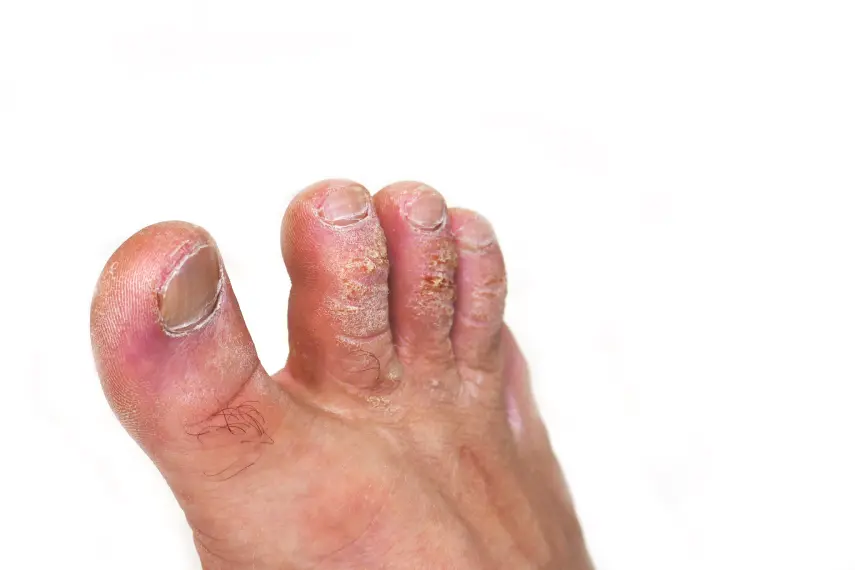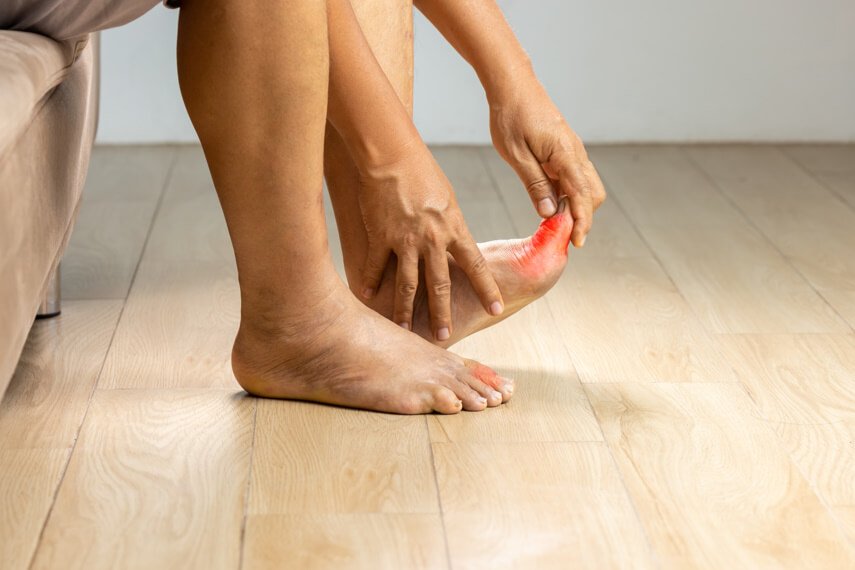Expert Fungal Infection Treatment in Surat for Healthy Skin and Feet
Fungal infections are among the most common skin issues, yet they are often underestimated. From mild itching to severe complications, these infections can disrupt daily life, especially for individuals with conditions like diabetes. If left untreated, they can spread and worsen, causing significant discomfort and health risks.
At Surat Diabetic Foot & Ulcer Clinic, under the expert care of Dr. Ashutosh Shah Surat, we specialise in providing comprehensive solutions for fungal infections, focusing on both prevention and cure. With tailored treatments and advanced methods, we aim to restore your skin's health and protect your feet from complications. Read on to learn about fungal infections, their symptoms, risks, and the specialised care available in Surat.
Understanding Fungal Infections
Fungal infections are skin conditions caused by microscopic fungi that thrive in warm, moist environments. These infections are common and can affect different parts of the body, including the skin, nails, and feet. They are often uncomfortable and can become severe if left untreated. Individuals with underlying health issues, such as diabetes, are particularly vulnerable to these infections.
Types of Fungal Infections
- Athlete’s Foot: A common fungal infection that primarily affects the toes and soles, causing intense itching, peeling, and redness.
- Ringworm: A contagious fungal infection that forms circular, scaly patches on the skin, despite its misleading name.
- Yeast Infections: These occur in warm, damp areas such as skin folds, leading to redness, irritation, and sometimes discomfort.
- Onychomycosis: A fungal infection of the nails, causing thickened, discoloured, and brittle nails that can be painful if untreated.
Causes of Fungal Infections
Environmental Factors
- High humidity levels and damp conditions promote fungal growth.
- Wearing unclean or non-breathable footwear traps moisture, creating an ideal breeding ground for fungi.
Health Conditions
- Individuals with diabetes are more prone to fungal infections due to weakened immunity and high blood sugar levels.
- Prolonged use of antibiotics can disrupt the natural balance of microorganisms in the body, leading to fungal overgrowth.
Poor Hygiene Practices
- Sharing personal items such as towels, razors, or nail clippers can spread infections.
- Failing to clean and dry the skin properly, especially after sweating, increases the risk of fungal infections.
Common Symptoms of Fungal Infections
Early detection of fungal infection symptoms is essential to prevent worsening or spreading of the condition. Some of the most noticeable signs include:
- Redness or Inflammation: Affected areas may appear red and swollen, indicating an active infection.
- Persistent Itching: Itching, especially between toes or in skin folds, is a hallmark symptom of many fungal infections.
- Peeling or Cracked Skin: Infections like athlete’s foot often cause the skin to peel or crack, making it vulnerable to further infection.
- Discoloured or Thickened Nails: Foot fungus treatment is often needed for nails that become yellow, brittle, or thickened.
- Foul Odour: In severe cases, fungal infections can emit an unpleasant smell.
Ignoring these symptoms or delaying treatment may allow the fungal infection to spread, making recovery more difficult. Advanced care from Surat Diabetic Foot Care, under the expertise of Dr. Ashutosh Shah Surat, ensures timely diagnosis and effective treatment to prevent complications.
By addressing these symptoms promptly and seeking specialised care, such as those available for diabetic foot problems, patients can avoid long-term damage to their skin and nails.
Why Fungal Infections Need Prompt Treatment
Risks of Delayed Treatment
- Persistent discomfort and pain.
- Secondary bacterial infections requiring more aggressive treatment.
- Damage to nails or permanent skin changes.
Complications in Diabetic Patients
For individuals with diabetic foot problems, fungal infections can escalate into serious conditions. Diabetic foot care is essential because:
- Reduced immunity slows the healing process.
- Infections can lead to ulcers or even amputations if untreated.
- Foot fungus treatment tailored for diabetic patients minimises risks.
At Surat Diabetic Foot Care, we prioritise diabetic patients, offering specialised attention to prevent and manage complications effectively.
Advanced Fungal Infection Treatment in Surat
Specialised Care at Surat Diabetic Foot & Ulcer Clinic
At Surat Diabetic Foot & Ulcer Clinic, we pride ourselves on offering top-tier fungal infection treatment tailored to each patient's needs. Fungal infections, particularly those affecting the skin and feet, require expert care to ensure effective treatment and prevent recurrence. Under the guidance of Dr. Ashutosh Shah Surat, a seasoned specialist, the clinic provides advanced, patient-centric solutions that address both the root cause and symptoms of fungus infection.
Dr. Ashutosh Shah Surat leverages years of experience in treating a wide range of skin and diabetic feet problems, ensuring comprehensive care for conditions like athlete’s foot, foot fungus, and nail infections. His approach combines cutting-edge treatments with personalised attention, making the clinic a trusted choice for patients in Surat.
Treatment Methods We Use
We adopt a holistic approach to fungal infection treatment, ensuring that every patient receives the best possible care. Our treatment methods include:
1. Topical and Oral Antifungal Medications:
2. Specialised Foot Care for Diabetic Patients:
3. Follow-Up Care:
By combining these methods, we deliver effective results and help patients regain their confidence and comfort.
Tips to Prevent Fungal Infections
While seeking professional treatment is crucial, adopting preventive measures can significantly reduce the risk of fungal infections.
Hygiene and Skin Care Tips
- Keep your skin clean and dry: Fungi thrive in moist environments, so it’s essential to dry your skin thoroughly after bathing or sweating.
- Avoid sharing personal items.Towels, footwear, and razors can spread fungal infections. Use your own items and keep them clean.
- Use antifungal powders or sprays. These can be particularly beneficial for individuals prone to infections, especially those with sweaty feet.
Lifestyle Changes for Healthy Skin
Implementing lifestyle changes can improve skin health and protect against fungal infection symptoms.
- Wear breathable footwear and moisture-wicking socks:Shoes made of materials like leather or canvas allow air circulation, reducing moisture buildup
- Eat a balanced diet rich in skin-friendly nutrients:These keep feet dry and reduce the risk of foot fungus.
- Stay hydrated to maintain skin health:Incorporate vitamins and nutrients that support skin health and boost immunity, such as Vitamin C and zinc.
- Stay hydrated: Proper hydration helps maintain skin elasticity and overall health.
By following these prevention tips and seeking professional care at Surat Diabetic Foot & Ulcer Clinic, you can effectively manage and prevent fungal infections. Our expertise in treating diabetic foot problems ensures that every patient receives the best possible care. Don't let fungal infections disrupt your life—seek expert care today!
Conclusion: Why Choose Surat Diabetic Foot & Ulcer Clinic?
Fungal infections require specialised care to ensure effective treatment and prevent recurrence. At Surat Diabetic Foot & Ulcer Clinic, our expertise in managing skin and diabetic foot problems makes us the go-to clinic for advanced fungal infection treatment in Surat. With a dedicated team and patient-first approach, we ensure you regain healthy skin and feet.
Don’t wait for symptoms to worsen. Book your consultation for fungal infection treatment in Surat with Dr. Ashutosh Shah today!
FAQs About Fungal Infections
What is the main cause of fungal infection?
Fungal infections are primarily caused by fungi thriving in warm, moist environments, often due to poor hygiene or weakened immunity.
How to remove fungus in the body?
Treatment includes topical creams, oral medications, and maintaining proper hygiene.
What is the best treatment for a fungal infection?
The best treatment involves antifungal medications prescribed by a healthcare professional.
What is the fastest way to get rid of skin fungus?
Early diagnosis and prompt use of prescribed antifungal treatments can ensure quick recovery.
What soap is good for skin fungus?
Antifungal soaps containing ingredients like ketoconazole or tea tree oil can help.
What kills fungus the fastest?
Prescription-strength antifungal medications work fastest to eliminate fungal infections.
How do I get rid of a fungal skin infection permanently?
Follow your treatment plan completely and adopt preventive measures to avoid recurrence.
What kills all fungus in the body?
Systemic antifungal medications target and eliminate fungi within the body.
How do you treat foot skin fungus?
Treatment includes antifungal creams, powders, and proper foot hygiene.
What is the best natural antifungal for skin?
Tea tree oil, coconut oil, and aloe vera have natural antifungal properties.
What kills foot fungus the fastest?
Topical antifungal medications combined with proper foot care ensure rapid results.
How to remove dead skin from feet?
Use a pumice stone or foot scrub after soaking your feet in warm water.
What is foot drop treatment?
Foot drop treatment includes therapies such as physical therapy, orthotic devices, and sometimes surgery to improve mobility. Early intervention at the Surat Diabetic Foot & Ulcer Clinic helps prevent further complications.




.jpg)

